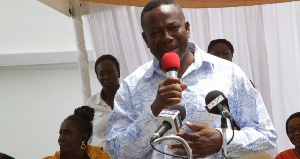Information pieced together by Today has revealed that about twenty (20) communities in the Ga West Municipal District of the Greater Accra Region will not be celebrating Homowo this year.
These communities include Ardeyman, Danchira, Avornyor, Ashalaja, Domeabra, Manhean, Oduman, Ablekuma Nsakinaa and Yaoman among others.
The underlying reason why the above communities will not take part in this year’s Homowo, Today’s findings revealed, is because of chieftaincy disputes. Almost all these Ga West Municipal communities are saddled with one chieftaincy issue and the other.
Interestingly, some of the communities have more than one chief, a situation that could easily trigger conflict should one of the chiefs in such communities decide to celebrate Homowo.
According to multiple sources, the decision to bar these communities was taken by the Amasaman Traditional Council (ATC) which has an oversight responsibility over communities under Ga West Municipal District.
“…and this was taken by the Amasaman Traditional Council in the interest and for the good of these communities. It will interest you to know that some of the feuding factions are waiting for the opportunity for the other parties to celebrate Homowo so they can use that as an excuse to foment trouble,” our sources told Today.
Significantly, Today also learnt that this is not the first time that these communities are being prevented from celebrating Homowo.
Last year (2016), the ATC took same decision by asking the communities not partake in the festival.
In areas where there are two chiefs, Today was reliably informed that such chiefs celebrate the festival privately in their homes with family members, friends and loved ones.
Our sources further revealed that these chieftaincy disputes were in no small manner stalling development in these areas.
This is in respect of the fact that there is no one legitimate chief representing such communities.
Meanwhile, a letter jointly written by the Ministry of Chieftaincy and Traditional Affairs and Ga Traditional Council, dated 28th July, 2017 and addressed to the chairman, Regional Security Council Greater Accra Region, sighted by Today, urged the Security Council “to exercise particular vigilance in some specific communities and royal houses in the Ga state ahead of the Homowo festival.
These communities, according to the letter, which was signed by Nii Dodoo Nsaki II, Otublohum Mantse and Acting President of GTC, are Abola, Asere, Kwabenya, Ardeyman, Nsakinaa, Danchira and Yaoman.
Copies of the said letter was made to the Regional Commander, Greater Accra, Ghana Police Service, the Commander, James Town Division, Ghana Police Service, the Mayor, Accra Metropolitan Assembly, Accra and the President, Regional House of Chiefs, Greater Accra, Dodowa.
On Abola, the letter explained thus: “The unresolved issue of the substantive Ga Mantse involving the following Ruling Houses- Amugi We, Teiko Tsuru We, Tackie Commey We and Abola Piam We could ignite a problem if the sprinkling of kpokpoi is not restricted only to their respective Houses.”
“Asere: The Chieftaincy issues pending which led to their palace being locked up as a result of the directive by the Acting President of the Ga Traditional Council Re: GTC/001V.5/37 to the Regional Commander, Ghana Police Service is hereby referred,” the letter averred.
With respect to Kwabenya, Ardeyman, Danchira, the letter cautioned that “these are areas where conflicts have recently occurred and need to be brought under the security lenses before and during the 2017 Homowo season.”
Homowo is a harvest festival celebrated by the Ga people from the Greater Accra Region.
It begins with the sowing of millet by the traditional priests in May. After this, a thirty-day ban on drumming is imposed on the land by the priests.
The festival is highlighted at varying times by different quarters of the Ga tribe. The Ga-Mashie group of the tribe will celebrate theirs a little earlier than the La group.
The festival recounts the migration of the Gas and reveals their agricultural success in their new settlement. According to Ga oral tradition, a severe famine broke out among the people during their migration to present day Accra. They were inspired by the famine to embark on massive food production exercises which eventually yielded them bumper harvest.
Their hunger ended and with great joy they “hooted at hunger.” So Homowo means “hooting at hunger.”
Regional News of Wednesday, 9 August 2017
Source: todaygh.com

















